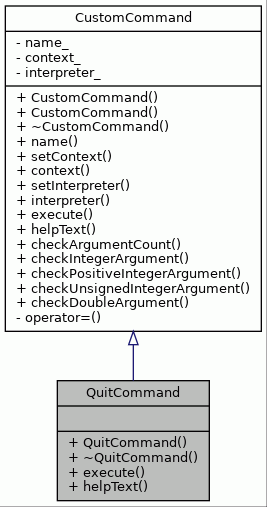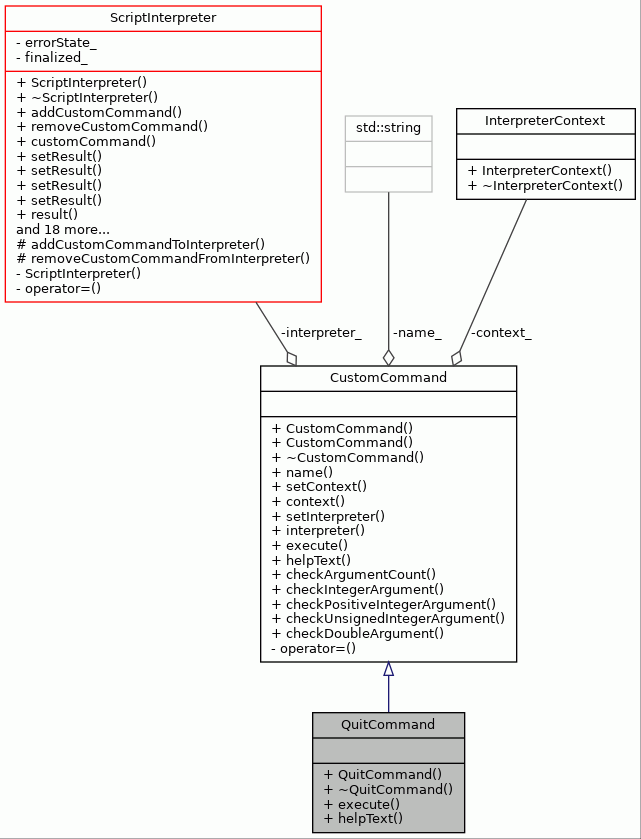#include <QuitCommand.hh>
Inheritance diagram for QuitCommand:

Collaboration diagram for QuitCommand:

Public Member Functions | |
| QuitCommand (const std::string &commandString="quit") | |
| virtual | ~QuitCommand () |
| virtual bool | execute (const std::vector< DataObject > &arguments) |
| virtual std::string | helpText () const |
 Public Member Functions inherited from CustomCommand Public Member Functions inherited from CustomCommand | |
| CustomCommand (std::string name) | |
| CustomCommand (const CustomCommand &cmd) | |
| virtual | ~CustomCommand () |
| std::string | name () const |
| void | setContext (InterpreterContext *context) |
| InterpreterContext * | context () const |
| void | setInterpreter (ScriptInterpreter *si) |
| ScriptInterpreter * | interpreter () const |
| bool | checkArgumentCount (int argumentCount, int minimum, int maximum) |
| bool | checkIntegerArgument (const DataObject &argument) |
| bool | checkPositiveIntegerArgument (const DataObject &argument) |
| bool | checkUnsignedIntegerArgument (const DataObject &argument) |
| bool | checkDoubleArgument (const DataObject &argument) |
Detailed Description
Implementation of the "quit" command of the Simulator Control Language.
Definition at line 46 of file QuitCommand.hh.
Constructor & Destructor Documentation
◆ QuitCommand()
| QuitCommand::QuitCommand | ( | const std::string & | commandString = "quit" | ) |
Constructor.
Sets the name of the command to the base class.
Definition at line 48 of file QuitCommand.cc.
◆ ~QuitCommand()
|
virtual |
Member Function Documentation
◆ execute()
|
virtual |
Executes the "quit" command.
This method does the uninitialization of the simulator.
- Parameters
-
arguments No arguments needed.
- Returns
- Always true.
- Exceptions
-
NumberFormatException Is never thrown by this command.
Implements CustomCommand.
Definition at line 71 of file QuitCommand.cc.
71 {
72 const int argumentCount = arguments.size() - 1;
74 return false;
75 }
77 return true;
78}
bool checkArgumentCount(int argumentCount, int minimum, int maximum)
Definition CustomCommand.cc:82
ScriptInterpreter * interpreter() const
References CustomCommand::checkArgumentCount(), and CustomCommand::interpreter().
Here is the call graph for this function:

◆ helpText()
|
virtual |
Returns the help text for this command.
Help text is searched from SimulatorTextGenerator.
- Returns
- The help text.
- Todo:
- Use SimulatorTextGenerator to get the help text.
Implements CustomCommand.
Definition at line 89 of file QuitCommand.cc.
89 {
91 Texts::TXT_INTERP_HELP_QUIT).str();
92}
static SimulatorTextGenerator & textGenerator()
Definition SimulatorToolbox.cc:75
@ TXT_INTERP_HELP_QUIT
Help text for command "quit" of the CLI.
Definition SimulatorTextGenerator.hh:65
References Texts::TextGenerator::text(), SimulatorToolbox::textGenerator(), and Texts::TXT_INTERP_HELP_QUIT.
Here is the call graph for this function:

The documentation for this class was generated from the following files: